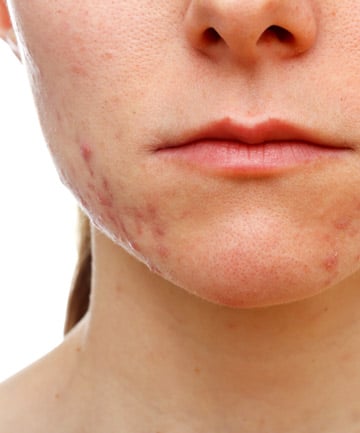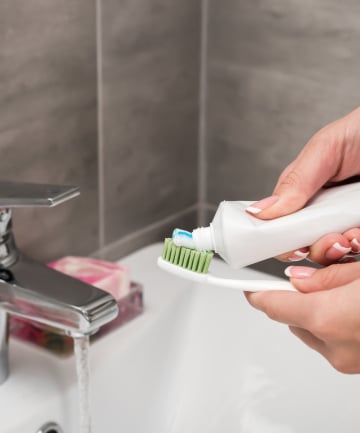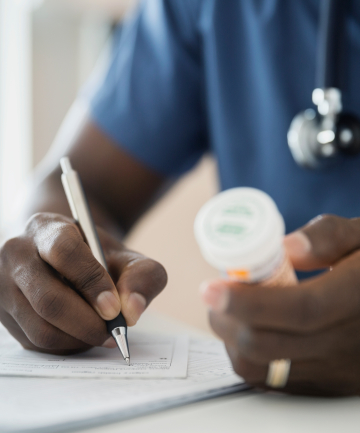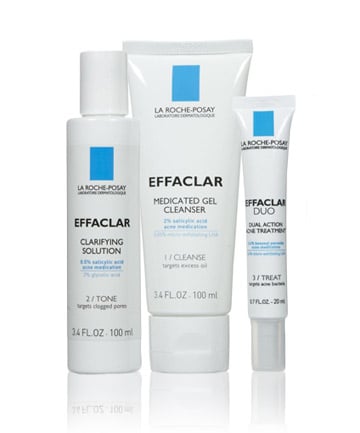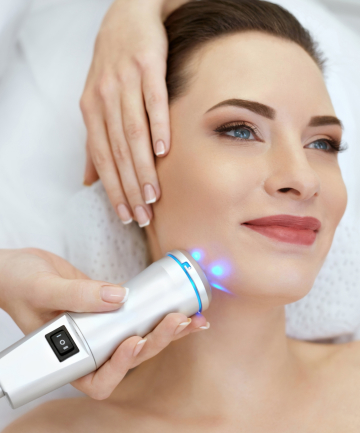If you're reading this, you're probably all too familiar with what chin acne looks like. But if you're simply a curious skin care buff, here's the deal: We're not talking about traditional blackheads or whiteheads.
"Most commonly the pimples are red angry bumps, sometimes pus pimples and sometimes painful undergrounders that do not come to the surface," says Zeichner. "Blackheads and whiteheads do occur, but I find they are less common in this group of patients and in this location."
Image via Obencem/Getty
"Most commonly the pimples are red angry bumps, sometimes pus pimples and sometimes painful undergrounders that do not come to the surface," says Zeichner. "Blackheads and whiteheads do occur, but I find they are less common in this group of patients and in this location."
Image via Obencem/Getty
If you're breaking out specifically around your mouth, you might be in luck — it might not be the dreaded "goatee of acne" after all. "It could be from your toothpaste or heavy lip products that are traveling onto your face," says Ingleton. "It may look like acne, but sometimes it's a form of dermatitis."
To determine whether your breakouts are hormonal or something else, you could go to a dermatologist ("we can tell just by looking at it," says Ingleton), or you can pay attention to your cycle. If you're only breaking out at certain times of the month, and if the acne tends to be focused more around your chin and jaw than your mouth, it's probably not dermatitis. Sorry.
Image via LightFieldStudios/Getty
To determine whether your breakouts are hormonal or something else, you could go to a dermatologist ("we can tell just by looking at it," says Ingleton), or you can pay attention to your cycle. If you're only breaking out at certain times of the month, and if the acne tends to be focused more around your chin and jaw than your mouth, it's probably not dermatitis. Sorry.
Image via LightFieldStudios/Getty
The best way to get rid of chin acne is to address the causes, which we know are most likely hormonal. Talk to your doctor about switching your birth control method until you find something that makes your skin happy — it's different for every woman.
If you'd rather not take hormonal birth control, ask your doctor about spironolactone — both Zeichner and Ingleton often prescribe it for patients suffering from chin acne. The drug is primarily used to treat high blood pressure, but it's been used off-label for acne for years. It regulates androgen hormone levels and can keep your sebaceous glands from overproducing sebum, which — you guessed it — contribute to chin acne.
Image via Hero Images/Getty
If you'd rather not take hormonal birth control, ask your doctor about spironolactone — both Zeichner and Ingleton often prescribe it for patients suffering from chin acne. The drug is primarily used to treat high blood pressure, but it's been used off-label for acne for years. It regulates androgen hormone levels and can keep your sebaceous glands from overproducing sebum, which — you guessed it — contribute to chin acne.
Image via Hero Images/Getty
So, what are the best products to tackle chin acne? There are countless fancy adult acne products on the market, but here's the truth behind the marketing speak: These products aren't all that different from the products you used when you were a teenager. The active ingredients are all the same. Per FDA regulations, if an over-the-counter product makes an acne claim it has to contain benzoyl peroxide or salicylic acid.
"Even though pimples are localized to the chin, we treat them very similarly to the same types of pimples on the rest of the face," explains Zeichner. He suggests starting with a 2.5-percent benzoyl peroxide product to kill acne-causing bacteria and working your way up to higher concentrations if it's not doing the trick. He also likes salicylic acid for its ability to "remove sticky skin cells that block the pores and eliminate excess oil."
We like La Roche-Posay Effaclar Dermatological System, which won a 2015 Total Beauty Award, because it contains both benzoyl peroxide and salicylic acid, it's gentle enough to use every day and it's a complete system.
"Even though pimples are localized to the chin, we treat them very similarly to the same types of pimples on the rest of the face," explains Zeichner. He suggests starting with a 2.5-percent benzoyl peroxide product to kill acne-causing bacteria and working your way up to higher concentrations if it's not doing the trick. He also likes salicylic acid for its ability to "remove sticky skin cells that block the pores and eliminate excess oil."
We like La Roche-Posay Effaclar Dermatological System, which won a 2015 Total Beauty Award, because it contains both benzoyl peroxide and salicylic acid, it's gentle enough to use every day and it's a complete system.
If you changed your birth control, and you've been diligently using anti-acne skin care products for weeks, but you're still not seeing a reduction in chin acne, it's time to make an appointment with a dermatologist. "In the office I have topical prescriptions including Aczone, Retin-A, Tazorac and Onexton, which are all helpful in adult women," says Zeichner.
If you're pregnant and dealing with chin acne, you might feel stuck with it until you deliver — most anti-acne ingredients are off limits when you're expecting. But if you're willing to add a weekly dermatologist visit to your already full dance card of doctors' appointments, Ingleton recommends weekly blue light treatments. The LED kills acne-causing bacteria, and it's perfectly safe while you're pregnant.
If you've done it all, and you're still not seeing results, know that — like teenage acne — this too shall pass. Our hormones are constantly changing as we age, and our skin changes right along with them.
Image via puhhha/Getty
If you're pregnant and dealing with chin acne, you might feel stuck with it until you deliver — most anti-acne ingredients are off limits when you're expecting. But if you're willing to add a weekly dermatologist visit to your already full dance card of doctors' appointments, Ingleton recommends weekly blue light treatments. The LED kills acne-causing bacteria, and it's perfectly safe while you're pregnant.
If you've done it all, and you're still not seeing results, know that — like teenage acne — this too shall pass. Our hormones are constantly changing as we age, and our skin changes right along with them.
Image via puhhha/Getty


